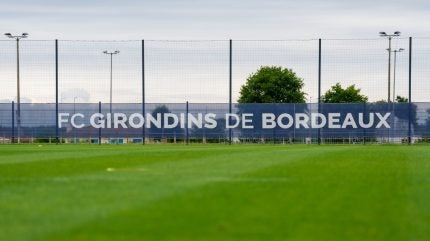
French soccer has been hit with the news that Girondins de Bordeaux, one of the nation’s most famous soccer clubs, has filed for bankruptcy after experiencing disastrous financial turmoil.
In its long history, Bordeaux has built a strong reputation for developing top talent, having had many well-known players represent the club including World Cup winners Zinedine Zidane, Christophe Dugarry, and Bixente Lizarazu.
The famous club has won six Ligue 1 titles, the last in 2009, and has a strong history of participation in European competitions, which included reaching the 1996 UEFA Cup final.
Despite playing in the second-tier Ligue 2 and struggling off the field, Bordeaux still attracted an average home attendance of 21,636 across the 2023-24 season, highlighting how the club has maintained a loyal fanbase during its worst times.
Founded as a sports club in 1881 and introducing soccer in 1910, Bordeaux is one of the oldest clubs in France. Since 2015, Les Girondins has played its matches at the Nouveau Stade de Bordeaux, a modern 42,115 stadium that has hosted UEFA Euro 2016 and Rugby World Cup matches.
The stadium is publicly owned, which caused major issues in the club’s takeover talks with Fenway Sports Group (FSG), as the Bordeaux council wanted assurances that the team’s $21.7 million debt would be written off and rental costs revised, something that FSG would not concede.

US Tariffs are shifting - will you react or anticipate?
Don’t let policy changes catch you off guard. Stay proactive with real-time data and expert analysis.
By GlobalDataBordeaux last played in France’s top division in the 2021-22 season. Across that campaign, the club was estimated by GlobalData to have earned $7.28 million from sponsorship agreements, which included a primary shirt sponsorship deal with the restaurant chain Bistro Regent, worth $3 million annually across four seasons and a five-year kit supplier deal with Adidas worth a total of $5.4 million.
Since participating in the second division of French soccer, Bordeaux has not been able to command the same value of sponsorship agreements, a big factor in the club’s financial turbulence.
Currently in French soccer, the biggest team sponsorship deal is reigning league champions Paris Saint-Germain’s (PSG) 13-year kit supplier partnership with Nike, worth $90.93 million annually. The deal is set to expire after the 2031-32 Ligue 1 season.
French club soccer is going through a very difficult period. Ligue 1 this week concluded its protracted domestic media rights saga, having agreed partnerships with sports streaming service DAZN and pay-TV giant BeIN Sports.
The deal runs from the upcoming 2024-25 season through 2028-29. As part of the agreements, DAZN will pay roughly $434 million a year to show eight out of the nine league matches in each gameweek, and BeIN Sports will pay $108 million annually to broadcast the biggest match each week, or the second biggest game every other round.
With many Ligue 1 teams facing bad financial situations, there was huge uncertainty across the league regarding the value achievable for the domestic media agreement.
In the end, the deal is the lowest Ligue 1 has signed in 20 years and spotlights the doubts around the strength of the competition with broadcasters being unwilling to commit substantial sums of media rights money as in previous seasons.
There are various factors why French soccer has struggled to demand a high value for its domestic media rights. Firstly, for years Ligue 1 has battled to keep its talented international players with many seeking other opportunities across Europe.
Secondly, the league has built a reputation for being uncompetitive with PSG being an almost unstoppable force, having won the Ligue 1 title in eight of the last 10 seasons.
Thirdly, clubs in Ligue 1 have historically struggled to make an impact on the European stage which has made the league far less attractive to fans outside of France.
Finally, a recent increase in violence at domestic matches has heavily stained the reputation of domestic soccer in the country. Across the 2023-24 Ligue 1 season, crowd trouble occurred at matches that included Clermont vs Montpellier and Marseille vs Lyon.
In October, Marseille fans attacked the Lyon team bus by throwing stones and beer bottles, injuring Lyon coach Fabio Grosso. The shocking assault was even condemned by French president Emmanuel Macron which deeply tarnished French soccer’s reputation.
For all these reasons, broadcasters no longer seem comfortable investing vast sums of money over multiple seasons to associate themselves with Ligue 1.
Across French soccer, many clubs including Angers, Auxerre, Brest, Le Havre, Lens, Montpellier, Nantes, and Reims are in financial difficulty and have uncertain futures having been unable to cope with the commercial hit that the Covid-19 pandemic had on them.
At least the signing of the new domestic deal will have eased some fears, with teams now being able to forecast their year’s finances.
However, there is still real concern that these clubs may follow in the footsteps of Bordeaux, ceasing to exist as a professional team once they fail to generate the revenue needed to survive.
With Ligue 1 losing its most prominent player, as Kylian Mbappé leaves PSG to sign for Real Madrid, domestic soccer has lost its poster boy which adds another challenge for France, looking to cement itself as one of the most appealing soccer markets in world soccer.
Mbappé’s own purchase of 80% of Ligue 2 side SM Caen for $21.6 million has brought back some glamour for the second-tier French league but demonstrates its low valuations.



